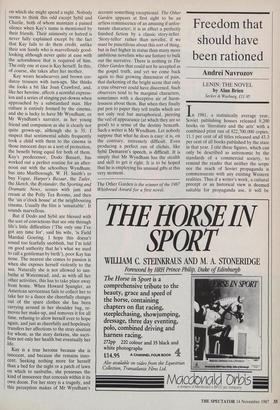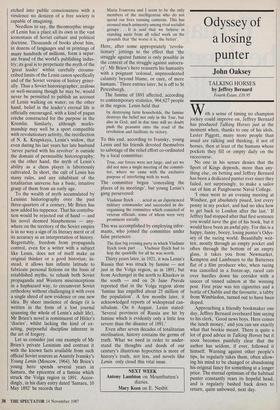Freedom that should have been rationed
Andrei Navrozov
LENIN: THE NOVEL by Alan Brien
Secker & Warburg, £11.95
In 1981, a statistically average year, Soviet publishing houses released 9,200 books on 'literature and the arts' with a combined print run of 822,700,000 copies, 11.1 per cent of all titles released and 43.3 per cent of all books published by the state in that year. I cite these figures, which can only be described as astronomic by the standards of a commercial society, to remind the reader that neither the scope nor the reach of Soviet propaganda is commensurate with any existing Western realities. Thus if a writer's work, a cultural precept or an historical view is deemed suitable for propaganda use, it will be etched into public consciousness with a virulence no denizen of a free society is capable of imagining.
Needless to say, the theomorphic image of Lenin has a place all its own in the vast iconostasis of Soviet culture and political doctrine. Thousands of books about him, in dozens of languages and in printings of many hundreds of millions, form a separ- ate brand of the world's publishing indus- try; its goal is to perpetuate the myth of the `great leader' within carefully circums- cribed limits of the Lenin canon specifically and of the Soviet version of history gener- ally. Thus a Soviet historiographer, zealous or well-meaning though he may be, would never be permitted to publish an account of Lenin walking on water; on the other hand, belief in the leader's eternal life is officially encouraged, with a kind of pagan crèche constructed for the purpose in the Kremlin. Similarly, although marks- manship may well be a sport compatible with revolutionary activity, the recollection of N. K. Krupskaya, Lenin's widow, that even during his last years her late husband `never parted with his revolver' is outside the domain of permissible historiography; on the other hand, the myth of Lenin's ability as a chess player is laboriously cultivated. In short, the cult of Lenin has many rules, and any inhabitant of the totalitarian universe, has a basic, intuitive grasp of them from an early age.
To the wealth of myth accumulated by Leninist historiography over the past three-quarters of a century, Mr Brien has now added his tuppence. That his contribu- tion would be rejected out of hand — and his novel deemed blasphemous — any- where on the territory of the Soviet empire is in no way a sign of its literary merit or of its accuracy as an interpretation of history. Regrettably, freedom from propaganda control, even for a writer with a subject like Lenin, does not of itself make an original thinker or a good historian; in- stead, it allows him infinite latitude to fabricate personal fictions on the basis of established myths, to rehash both Soviet propaganda and Western misconceptions in a haphazard way, to circumvent Soviet orthodoxy without challenging it with even a single shred of new evidence or one new idea. By sheer insolence of design (it is written in the form of a lost journal spanning the whole of Lenin's adult life), Mr Brien's novel is reminiscent of Hitler's `diaries', whilst lacking the kind of ex- acting, purposeful discipline inherent in the art of forgery.
Let us consider just one example of Mr Brien's private Leninism and contrast it with the known facts available from such official Soviet sources as Anatoly Ivansky's Young Lenin (Moscow, 1964). Mr Brien's young hero spends several years in Samara, the epicentre of a famine which struck the Volga region in 1891. Accor- dingly, in his diary entry dated 'Samara, 10 May 1892' he records that
Maria Ivanovna and I seem to be the only members of the intelligentsia who do not spend our lives running canteens. This has aroused much animosity among rival socialist groups . . . It is said that we believe in standing aside from all relief work on the grounds that 'the worse it is, the better'.
Here, after some appropriately 'revolu- tionary' jottings to the effect that 'the struggle against famine is only possible in the context of the struggle against autocra- cy', Mr Brien's hero reasserts his humanity with a poignant 'colossal, unprecedented calamity beyond blame, or cure, of mere humans.' Three entries later, he is off to St Petersburgh.
The famine of 1891 affected, according to comtemporary statistics, 964,627 people in the region. Lenin held that
by destroying farm households, the famine destroys the belief not only in the Tsar, but also in God, and in due time will no doubt push the peasants onto the road of the revolution and facilitate its victory.
To this end, according to Ivansky, young Lenin and his friends devoted themselves to sabotage of the relief effort co-ordinated by a local committee:
True, our forces were not large, and yet we did not miss a single meeting of the commit- tee, where we came with the exclusive purpose of interfering with its work.
The committee began 'concealing the places of its meetings', but young Lenin's gang persevered:
Vladimir Ilyich . . . acted as an experienced military commander and succeeded in dis- organising the committee which consisted of veteran officials, some of whom were very prominent socially.
This was accomplished by employing infor- mants, who joined the committee under false pretences:
The first big evening party in which Vladimir Ilyich took part . . . Vladimir Ilyich had to hop the quadrille for all he was worth.
Thirty years later, in 1921, it was Lenin's Russia that was struck by famine — not just in the Volga region, as in 1891, but from Archangel in the north to Kharkov in the south — and on 26 June Pravda reported that in the Volga region alone `famine has engulfed about 25 million of the population'. A few months later, it acknowledged reports of widespread can- nibalism. On 6 August, Lenin stated: `Several provinces of Russia are hit by famine which is evidently only a little less severe than the disaster of 1891.'
Even after seven decades of totalitarian sterilisation, history contains the germs of truth. What we need in order to under- stand the thoughts and deeds of our century's illustrious hypocrites is more of history's truth, not less, and novels like Lenin only cloud this vital issue.











































































 Previous page
Previous page